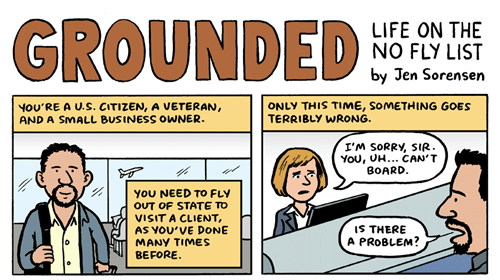
A secret government watchlist that traps innocent Americans in a Kafkaesque nightmare was dealt a major blow yesterday.
A federal court in Oregon struck down as unconstitutional the government's system for challenging inclusion on the No Fly List. The first-of-its-kind ruling came in our lawsuit on behalf of 13 Americans who have been blacklisted from flying for years based on secret evidence and under a secret standard, with no meaningful opportunity to contest their status on the list and clear their names.
By totally banning listed individuals from flights to, from, or within the United States, the No Fly List can separate people from their families, prevent them from getting or keeping jobs, and interfere with their religious obligations, to say nothing of stigmatizing them as suspected terrorists. Like the court in our case, several federal courts have acknowledged in recent months that placement on the No Fly List can be devastating.
(For an illustration of the effects of the No Fly List, check out our comic, Grounded: Life on the No Fly List)
If that weren't bad enough, the "redress" procedures the U.S. government provides for those who have been wrongly or mistakenly included on the No Fly List are deeply flawed. The government has an official policy of refusing to confirm or to deny whether anyone is on the list even after people are publicly prevented from boarding, and even after government agents tell individuals – like some of our clients – that they can get off the list if they will agree to become informants in their communities. People placed on the list have no meaningful way to contest whatever secret evidence the government uses as a basis for inclusion, to correct bad information, and to clear their names.
In yesterday's ruling, the court agreed with us that the redress procedure "falls far short of satisfying the requirements of due process," and is "wholly ineffective." The court warned that "without proper notice and an opportunity to be heard, an individual could be doomed to indefinite placement on the No-Fly List" – precisely what has happened to our clients and many others on the List.
In August 2013, the court had concluded that the No Fly List raised serious constitutional concerns, and that the Constitution applies when the government bans Americans from flying. The court nonetheless asked for further information about the process – the Department of Homeland Security's Traveler Redress Inquiry Program (DHS TRIP) – that the government has put in place for getting off the list.
The court ultimately concluded that the lack of any meaningful opportunity to contest their placement on the No Fly List violates our clients' constitutional due process rights. The government now has to come up with a new process that satisfies the Constitution, including officially telling our clients whether they are on the No Fly List, providing reasons for their inclusion, and giving them the ability to contest the basis for that inclusion before a judge.
In detailing the many ways in which the No Fly List procedures are flawed, this ruling also benefits other people wrongly stuck on the No Fly List, and serves as a wake-up call for the government to fix its broken watchlist system.
It's the Constitution and individual lives – not national security – that are harmed when the government blacklists people while denying them the right to defend themselves against government mistakes.
Learn more about the no-fly list and other civil liberties issues: Sign up for breaking news alerts, follow us on Twitter, and like us on Facebook.

